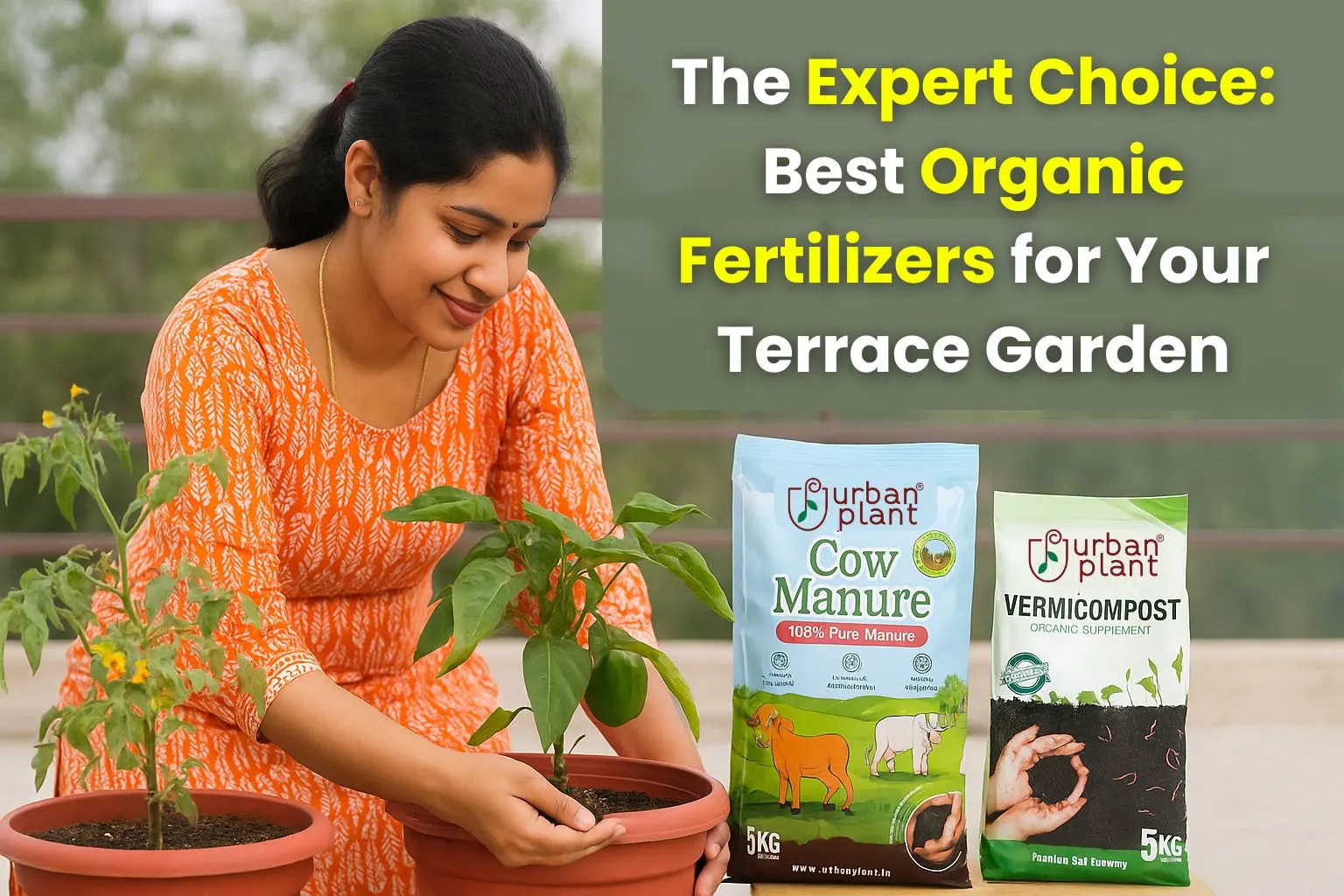
A healthy terrace garden depends on the right fertilizer to keep plants lush and productive.
Container soil can quickly lose nutrients due to limited volume and frequent watering, so choosing the best terrace garden fertilizer is essential.
In this in-depth guide, we’ll explore the best fertilizers for terrace gardening in India, focusing on organic and safe options for home use.
Let’s dive in and help your rooftop or balcony garden thrive with proper nourishment!
Best Fertilizer for Terrace Garden in India

When it comes to the best fertilizer for terrace garden in India, organic options top the list.
Indian urban gardeners often prefer natural fertilizers that enrich the soil sustainably without harsh chemicals.
Some of the best fertilizers for terrace gardening include:
1. Vermicompost (Worm Compost):
Vermicompost is nutrient-rich and improves soil health. It’s a slow-release organic fertilizer that provides essential NPK nutrients and beneficial microbes.
For example, well-made vermicompost or products like Urban Plant Vermicompost Organic Fertilizer can be mixed into potting soil or used as top-dressing to boost growth.
2. Cow Dung Manure
A traditional favorite in India, well-rotted cow dung manure is packed with nitrogen, phosphorus, and potassium for overall plant growth.
It improves soil structure and water retention, making it ideal for terrace pots. Many Indian gardeners use cow manure as a base fertilizer – it’s natural, safe, and effective.
3. Compost (Kitchen or Garden Compost)
Regular compost made from kitchen scraps or leaf litter adds a broad range of nutrients.
It’s an organic fertilizer for terrace plants that also increases soil organic matter.
4. Organic Liquid Fertilizers
Liquid tonics like seaweed extract, fish emulsion, or compost tea give quick nutrient boosts.
These can be diluted and watered into pots for instant feeding.
For instance, a seaweed extract solution provides micronutrients and growth hormones to container plants.
Using these ensures your terrace garden gets balanced nutrition without chemical buildup.
By choosing the right fertilizer (or a combination), you’ll set a strong foundation for your container garden.
Read More Gardening Inspiration
Stop Overwatering! These 7 Plants Love Self-Watering Pots And Never Complain
8 Easy Ways: How to Revive Dead or Dying Plants
10 Clever Hanging Plant Ideas for Apartments (No-Drill Guide for Renters)
Organic Fertilizers for Terrace Plants

Organic fertilizers are considered the safest and most sustainable choice for terrace gardening.
They improve soil quality over time and are safe fertilizers for home gardening – meaning they won’t harm kids, pets, or beneficial insects in your home.
Here are key organic fertilizers for terrace plants and their benefits:
a) Vermicompost
As mentioned, worm castings (vermicompost) are a powerhouse of nutrients.
They enrich soil with organic matter, enhance microbial activity, and support robust root growth.
To use, mix 1 part vermicompost into 4–5 parts potting soil when planting, or sprinkle a cup around existing plants and water in.
b) Neem Cake and Mustard Cake
These are by-products of neem seeds and mustard seeds after oil extraction, commonly used in Indian organic gardening.
They act as both fertilizer and pest repellent. Neem cake provides nitrogen and protects roots from some soil pests.
c) Green Manure and Leaf Compost
If you have space, composting dry leaves (leaf mold) creates an excellent conditioner for potting mix, improving water retention.
Why go organic?
Organic fertilizers release nutrients gradually, which prevents over-fertilization and “burning” of plants.
They also improve soil health, making your terrace garden more resilient. Chemical fertilizers can sometimes lead to salt buildup in pots or harm beneficial soil life.
In a home setting, organic options are much safer – as noted in a government release, urban gardeners using cow dung and compost enjoy healthy and safe food from their terrace gardens without any chemical residues.
(Tip: Start your own mini compost bin on the terrace – it’s a great way to recycle kitchen waste into free fertilizer. Even a bucket or crate with some soil and earthworms can turn vegetable peels into rich compost in a couple of months!)
Rainy Season Fertilizer Tips for Terrace Garden

The Indian rainy season (monsoon) poses unique challenges for fertilizing a terrace garden.
With heavy showers from June to September in many regions, nutrients can quickly leach out of pots due to excess water.
Here are some rainy season fertilizer tips to keep your terrace plants nourished without waste:
1. Fertilize Less Frequently
During monsoons, less is more when it comes to feeding plants. Heavy rain can wash away soluble nutrients from the potting mix.
Over-fertilizing in this period is not only wasteful but can also harm roots if chemicals concentrate when water evaporates.
2. Use Slow-Release Organic Nutrients
Switch to slow-release fertilizers like compost or vermicompost in the rainy season.
These will release nutrients gradually and are less likely to leach out compared to synthetic chemical fertilizers.
For example, add a handful of vermicompost or manure on the soil surface – rain will slowly wash the nutrients into the soil without overwhelming the plant.
3. Avoid Strong Chemical Fertilizers
It’s best to avoid chemical fertilizers during heavy rains.
Granular NPK or urea can dissolve too quickly and either run off or create a concentration that might “burn” the roots once the water drains. They can also pollute runoff water.
If you must use a chemical fertilizer, apply in very small doses and only when you expect a few dry days ahead.
4. Protect Fertilizer from Wash-Out
One strategy is to cover the topsoil of your pots with a layer of mulch (dry leaves, cocopeat, etc.) after fertilizing.
This mulch can help prevent heavy rain from directly splashing and eroding the soil (and fertilizer) out of the pot.
As one expert gardener advises: “Monsoon is great for plants if you manage water wisely. Watch the soil, and they’ll reward you with lush growth.”
Fertilizer for Terrace Vegetables

Growing vegetables on a terrace or balcony is hugely rewarding – you get fresh organic produce right at home.
To get a good harvest in containers, providing the right fertilizer for your terrace vegetables is crucial.
Edible plants are often heavy feeders, meaning they consume lots of nutrients to produce fruits and foliage.
Here’s how to keep your terrace veggies well-fed:
Use a Balanced Nutrient Mix
Vegetables generally need a balanced supply of macronutrients – Nitrogen (for leaves), Phosphorus (for roots/flowers), and Potassium (for overall health and fruits) – often abbreviated as N-P-K. For container veggies, a balanced fertilizer like 10-10-10 NPK or similar ratio is effective
This ensures they get all three nutrients equally.
You can achieve this balance with organic means too: e.g. nitrogen from compost or manure, phosphorus from bone meal, potassium from wood ash or banana peel compost, etc.
Fertilize Regularly but Mildly
In limited soil, vegetables exhaust nutrients faster. It’s generally recommended to fertilize terrace vegetables about every 4–6 weeks during their growing season
However, use moderate amounts each time to avoid overloading.
For instance, you might mix a tablespoon of organic vegetable fertilizer or a couple of handfuls of compost into a medium pot (12 inch) every month.
Incorporate Fertilizer into Soil
When planting veggies in containers, mix some slow-release fertilizer into the potting mix.
A common practice is blending compost or vermicompost into the soil at planting time.
This gives young plants a nutrient-rich start. For example, add 20-25% compost in the potting mix for each grow bag or pot when you transplant seedlings.
Top-Dressing and Liquid Feeding
For longer-growing veggies (tomatoes, eggplants, peppers which grow for many months), use a combination of feeding methods.
Top-dress with organic manure or compost every month by adding it around the plant base and lightly mixing into the topsoil.
By tailoring your fertilization to the types of vegetables and their growth stages, you’ll boost your yields.
Always observe your plants – pale or yellow lower leaves might mean they’re hungry for nutrients, while very dark green, overly lush foliage but no flowers might mean too much nitrogen.
Adjust feeding as needed. With the right fertilizer regimen, your terrace vegetable garden will reward you with bountiful harvests season after season
(Expert tip: Conduct a soil test of your potting mix once a year if possible. Many garden centers offer services to check NPK and pH. This can guide you on what your soil lacks – for example, if low in potassium, you can add more banana peel compost or potash. Balancing your soil nutrients leads to healthier veggies.)
Safe Fertilizers for Home Gardening

When gardening in a home environment – especially on a balcony or terrace that is part of your living space – using safe fertilizers is a top priority.
Safe fertilizers are those that are non-toxic, natural, and pose no risk to humans, pets, or the environment when used correctly.
Here’s what to consider for safe terrace garden fertilization:
Go Organic and Natural
Organic fertilizers such as compost, manure, bone meal, neem cake, etc., are derived from natural sources and contain no synthetic chemicals.
They are safe to handle (with basic hygiene like washing hands after) and safe for kids or pets that may be around your plants.
In contrast, synthetic fertilizers (like urea or DAP granules) are chemicals that can irritate skin or be harmful if ingested.
By sticking to organic inputs, you ensure your garden area remains non-toxic.
Avoid Overuse of Chemicals
If you do use any chemical plant food, use it sparingly and store it safely out of reach of children.
Overusing chemical fertilizers can lead to salt accumulation in the soil which might harm plants and can be unsafe if those salts leach onto surfaces where people walk or play.
Choose Certified Products
Look for organic fertilizers that are certified by agencies (like OMRI or India Organic certification) which ensures they meet certain safety and quality standards.
For example, products from trusted brands (including Urban Plant’s organic range) are formulated to be safe for home use – no harmful additives.
Safe for Edibles
Using safe fertilizers is especially important for vegetables, fruits, and herbs you will eat.
Organic manures and compost ensure that no chemical residues end up in your food. They also promote beneficial soil microbes which can suppress pathogens naturally.
By prioritizing safe, organic fertilizers, you create a garden that is a healthy space for both plants and your family.
You’ll have peace of mind knowing that your terrace garden is free of harmful substances, and as a bonus, organic methods often make gardening simpler (no worries about exact measurements of strong chemicals, no risk of “burning” plants).
FAQs: Terrace Garden Fertilizer
What is the best fertilizer for terrace garden?
Vermicompost and cow dung manure are the best fertilizers for terrace gardens in India.
Which fertilizer is safe for terrace vegetables?
Organic fertilizers like compost, neem cake, and mustard cake are safe for terrace vegetables.
How often to fertilize terrace garden plants?
Fertilize every 4–6 weeks during the growing season.
Can I use chemical fertilizers on my terrace garden?
Yes, but organic fertilizers are safer and more sustainable.
What fertilizer works best during the rainy season?
Slow-release compost and vermicompost work best in monsoon.
Which fertilizer gives fast results for terrace plants?
Seaweed extract and compost tea give quick, visible results.
Is cow dung good for terrace gardening?
Yes, aged cow dung is rich in nutrients and ideal for terrace plants.
How to fertilize terrace plants naturally?
Use homemade compost, banana peels, or diluted kitchen waste.
What is the best fertilizer for potted vegetables?
A mix of compost, vermicompost, and bone meal suits potted vegetables.
Do terrace plants need regular fertilizer?
Yes, potted terrace plants need regular feeding to stay healthy.
Conclusion: Your Terrace Garden’s Fertilizer Success Blueprint
Successfully maintaining a vibrant terrace garden in Indian weather conditions involves understanding fertilizer types, proper application schedules, and safety measures.
Prioritize organic options for safe and sustainable gardening, and don't hesitate to explore and experiment with urban gardening products specifically designed for Indian urban conditions.
Follow these guidelines, and watch your terrace garden flourish beautifully throughout the year.





